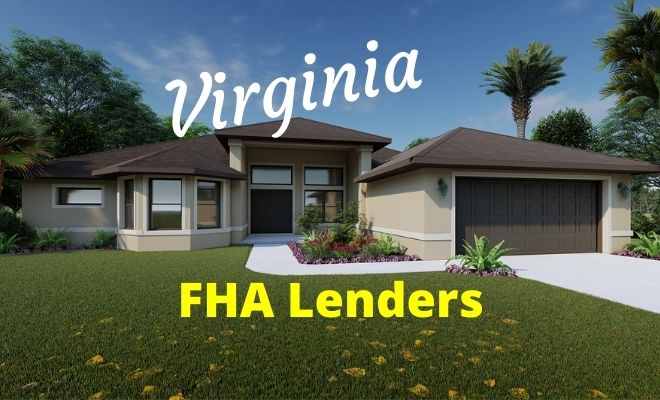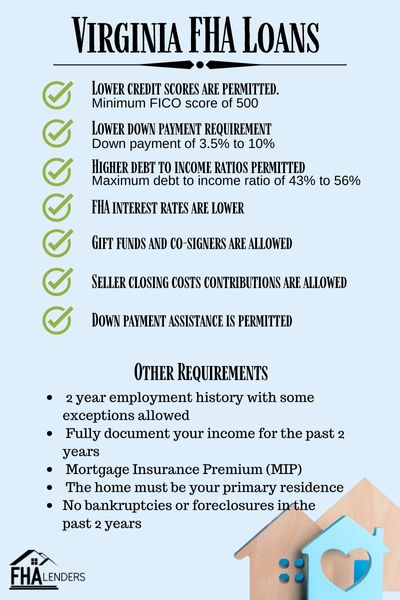Virginia FHA Loans – Requirements and Loan Limits for 2024 – Virginia FHA Lenders

FHA loans offer a flexible path to homeownership for many looking to buy homes in Virginia. They are backed by the Federal Housing Administration, enabling applicants with lower credit scores or higher debt-to-income ratios to qualify for home loan. Think of them as helping hands, offering opportunities even when traditional loan conditions seem limiting.
Virginia home buyers who need a small down payment or have poor credit scores may be able to purchase a home with an Virginia FHA loan. There are many FHA lenders in Virginia who offer FHA loans, but not all of them participate in all of the FHA loan options available.
We will take you through the Virginia FHA loan requirements, detail what is needed to qualify, then help you to get pre-qualified. If you already know that an FHA loan is right for you, then click to speak with one of our loan officers who can help you today.
Types of FHA Loans in Virginia
In Virginia, borrowers can access various FHA loan programs, including FHA Streamline Refinance, 203k Rehab loans, Construction Loans, and specialized offerings for individuals such as nurses. Our comprehensive resources detail eligibility requirements, credit considerations, and how to connect with a trusted Virginia-based FHA lender to explore these options further
There are various types of FHA loans available in the state of Virginia for both purchases and also refinances. Each of these are for a specific situation that a home buyer or current homeowner may encounter. Although these programs are available, not every lender offers them and the ones who do may have their own unique requirements.
- Standard Purchase
- Standard Refinance
- FHA 203k Rehab (when buying or refinancing)
- FHA Streamline Refinance
- FHA One Time Close Construction Loan
- FHA Cash Out Refinance
- FHA Energy Efficient Mortgage
We will review some of these programs below and will provide additional information.
Virginia FHA Loan Benefits
These are the benefits of an FHA loan versus a conventional loan:
- Lower credit scores permitted
- Lower down payment requirement
- FHA interest rates are lower than conventional rates
- Gift funds allowed
- Seller closing cost contributions are allowed
- FHA loans are assumable
- Co-signers allowed
- Higher debt to income ratios permitted
Chryl Shaw – Loan Simple Inc – Aylett Virginia – “FHA loans can be used to cash equity out of your home even if you already have an FHA loan“
Eligibility Criteria for FHA Loans in Virginia
When it comes to FHA loans, certain criteria must be met to qualify. These are the basic FHA loan requirements for this year. All of these must be met to be approved for an FHA loan. If you are not positive on whether you meet these standards or have questions, an FHA lender can help.
- Down payment of 3.5% or 10% if your credit score is below 580
- 2-year employment history with some exceptions allowed
- Fully document your income for the past two years
- Minimum FICO score requirement of 500 – down payment will vary
- Mortgage Insurance Premium (MIP) is required for every FHA loan
- Maximum debt to income ratio of 43% with exceptions up to 56%
- The home must be your primary residence
- No bankruptcies or foreclosures in the past two years
Credit Score
To qualify for an FHA loan, your credit score is a critical factor. While conventional loans often require higher credit scores, FHA loans are more lenient, accepting scores as low as 500 to 580 with a 10% down payment or 3.5% down with a score of 580 or higher. This provides an opportunity for borrowers with lower credit scores to become homeowners, especially when financial circumstances have made it challenging to maintain an excellent credit rating.
This approach acknowledges that life can throw unexpected curveballs, and a person’s financial health may take a hit due to situations beyond their control. It’s a pathway for individuals in Virginia who have demonstrated financial responsibility in recent years but may have had past challenges that affected their credit score.
Debt-to-Income Ratio
Another factor is the debt-to-income ratio, which measures your monthly debt payments in relation to your monthly gross income. The FHA allows for a higher debt-to-income ratio compared to conventional loans, accommodating borrowers with slightly higher monthly debt obligations. This offers some flexibility, understanding that various financial obligations such as student loans, car payments, and other unavoidable expenses can impact one’s ability to keep expenditure ratios low.
Maintaining a balance between sustaining affordable mortgage payments and managing essential living costs is an intricate process that doesn’t fit into a one-size-fits-all mold. The FHA recognizes this and aims to provide options for individuals facing varying financial responsibilities.
Read more about the FHA Debt to Income Ratio Requirements.
Property Requirements
In addition to borrower eligibility, FHA loans also have specific property requirements that extend beyond traditional mortgage standards. These guidelines aim to ensure safety and livability for the individuals purchasing these homes. Minimum property standards serve as a protective measure, addressing structural integrity requirements such as ensuring proper sanitation facilities, safe electrical systems, adequate heating, and more.
For instance, FHA property requirements might include ensuring that there are no peeling paint hazards on homes built before 1978 which could lead to lead exposure—posing significant health risks, particularly for children.
Understanding these eligibility criteria underlines the inclusive approach of FHA loans in Virginia – providing opportunities for homeownership by considering a wider range of financial circumstances and ensuring the safety and livability of properties participating in the program.
Virginia FHA Down Payment Requirements
The down payment requirements for an FHA loan is the same in every state. The minimum requirement for an FHA loan is 3.5% of the purchase price. However, if your credit score is below 580, then the down payment requirement will be 10%.
If you do not have the down payment needed, you can also use gift funds from a relative.
Virginia FHA Down Payment Assistance
There are various down payment assistance programs in every state. Below is a list of just a few down payment assistance programs that may be available to you in Virginia. Home buyers will need to contact, and arrange for these programs independently. Lenders will accept the funds from these programs for your down payment but they will not arrange for the down payment assistance.
Virignia Down Payment Assistance Grant
Home Ownership Down Payment and Assistance Program
We also have access to lender provided down payment assistance. Lenders who offer this as an option will include the down payment assistance as part of their total loan package. Sometimes as a separate loan for the down payment which may or may not be forgivable. Contact us to learn more.
Virginia FHA Loan Limits
Every county in the United States has specific maximum loan limits that are set for single family homes, as well as 2-4 unit properties. The limits are set based upon the average home sales value in that county.
The FHA loan limits vary for each county and are set to meet the average median home cost in each area. This FHA Loan limit listing below will be kept updated so you may bookmark the page for future reference.
FHA 203k Loans in Virginia
FHA 203k loans are a great program which will allow you to borrow the money needed to purchase the home plus additional funds needed to rehabilitate or remodel the home. This program is also available in your state and we work with lenders that help with your FHA 203k loan.
If you would like to fully understand how this program works, we suggest reading our article on FHA 203k loans.
FHA Streamline Refinance in Virginia
The FHA streamline refinance program is available to existing homeowners who would like to refinance for a lower rate while eliminating some of the refinance costs such as an appraisal. You may also get a discount on the mortgage insurance premium which is another advantage.
For more information, please read our article on the FHA streamline refinance.
FHA Construction Loans in Virginia
You may be interested in building your home in Virginia rather than purchasing a pre-existing home. You may qualify for the FHA One Time Close Construction Loan which will allow you to purchase a lot and also build your dream home all with just 3.5% down.
The loan will cover the cost of the lot, your architect and engineering, permits and the complete cost of the build. If you already own your lot, the equity can be used towards the down payment.
This is one of the most affordable ways to build your dream home. Although FHA guidelines permit credit scores down to 500, you can expect the requirements for the construction loan to be much higher.
The first step is to see how much you can get approved for. Then, you will need to find a builder and possibly an architect if you are looking for a custom home. Be prepared for a lot of work for you as the Virginia homebuyer.
To start the process, contact us here to see how much you can get approved for and also to answer any of your questions.
Virginia FHA Loan Pre-Approval Process
If you are looking for an FHA loan, there is an optimal process you should follow to get pre-approved. The steps include providing your financial information so the loan officer can evaluate your creditworthiness and give you a pre-approval letter. Now, this letter is special—it tells sellers that a lender has verified your information and you’re approved for a specific loan amount. Most Virginia real estate agents will require this pre approval documentation before taking you on a home tour.
- The first step is to make sure you have the minimum down payment needed to qualify
- check your credit and try to cleanup anything that is pulling down your scores
- Get a copy of your tax returns for the past two years
- Get copies of your pay stubs for the past month
- Get copies of your last two months’ bank statements
- Speak to an FHA lender about your loan scenario
Speak to us early in the process because they can identify opportunities to help with your FHA approval. This should be done months before you start looking for a home. Read more about how to get pre-approved for an FHA loan.

What to Look for in an FHA Lender
We take a few things into consideration when looking at which lenders we work with. Some of these also may be, or should be very important to you as you continue shopping for an FHA loan.
A good FHA lender will:
- Allow for credit scores as low as 500
- Provide FHA 203k loans
- Offer competitive rates and fees
- Have a great processing and underwriting team
- Work closely with you throughout the loan process
- Communicate well and will provide you with updates along the way
This is exactly what we will do for you. Click to speak with one of our loan officers.
Insurance
Interest
Insurance
Insurance
Amount
Amount
Insurance
Understanding Rates and Costs Associated with FHA Loans
When considering an FHA loan, it is important to understand all the costs involved. Let’s start by discussing the mortgage insurance premium (MIP), a critical factor that sets FHA loans apart from conventional ones.
Mortgage Insurance Premium (MIP)
FHA loans require both an upfront and an annual MIP. The purpose of this insurance premium is to safeguard the lender in case the borrower defaults on the loan. The upfront premium is generally added to the loan amount, while the annual premium is paid as part of your monthly mortgage payments.
It’s essential to factor these premiums into your budget when planning for homeownership with an FHA loan. The MIP enables borrowers with lower credit scores and smaller down payments to obtain a mortgage, ultimately making homeownership accessible to more people. Understanding MIP provides homebuyers with a comprehensive view of the lending landscape, helping them gauge its long-term financial impact.
We can help you to determine what your payment will be and how much of it will go towards the mortgage insurance premium each month.
Interest Rates
Interest rates on FHA loans are influenced by various factors including your credit score, market conditions, and economic indicators. These rates can fluctuate over time due to changing market conditions.
FHA loans happen to have the best rates of all programs if your credit scores are good. Rates can change multiple times per say as economic indicators also change. When it comes time to lock your rate, we will have a discussion to make sure you are comfortable with the decision.
Closing Costs
Like any mortgage, FHA loans involve closing costs such as appraisal fees, title insurance, and origination fees, typically incurred at the time of closing. Understanding and planning for these costs is key to ensuring a smooth transition into homeownership.
Homebuyers should budget not only for their down payment but also for additional expenses required at closing. Most of the closing costs are not generated by the lender but instead are third party costs. We can help you to provide solutions to lower your out of pocket expenses at closing.
Frequently Asked FHA Questions
Can I get an FHA loan with a bankruptcy?
In general, you will need to wait two years before applying for an FHA loan after a bankruptcy. However, there are some exceptions which may allow you to apply sooner. Read our article on the bankruptcy waiting period.
Are all FHA lenders the same?
Not all lenders who offer FHA loans are the same. They all do not offer all of the FHA programs and their rates and fees may also vary. Most importantly, the individuals who help to process and underwrite your loan will have a huge impact on your FHA loan experience.
Can I use gift funds for an FHA loan?
FHA loans do allow for gift funds to cover your down payment as well as your closing costs. The gift funds must come from a relative or a close friend as approved by the lender. You will need to provide the lender with a gift letter that is signed by the donor.
Do I need an appraisal for an FHA loan?
The FHA does require an appraisal and inspection before your loan can be approved. The FHA inspection has clear guidelines on what needs to be repaired before your loan can close. They want to make sure home buyers are moving into a home that is safe and operational.
Can I get an FHA loan for an investment property?
FHA loans are for primary residences only and if your goal is to purchase an investment property, you cannot use FHA insured financing for that purchase. However, if you are currently living in a home that is financed with an FHA loan, you can move to a new home and keep the current home as an investment.
Virginia Home Buying Statistics
If you are thinking about buying a home in Virginia, these home buying statistics may be interesting and relevant to you.
Population = 8,683,600
Number of Housing Units = 3,68,300
Percent of Housing Units that are Owner Occupied = 66.6%
Average Home Value = $335,500
Average Mortgage Payment = $2,190
Average commute time to work = 28.2 minutes
Top Virginia Cities by Population
Virginia Beach – 455,618
Chesapeake – 252,488
Arlington – 235,764
Norfolk – 232,995
Richmond– 229,395
Newport News – 184,306
Alexandria – 155,525
Hampton – 138,037
Suffolk – 98,537
Roanoke – 97,847
*References (US Census – Virginia Demographics)

For Consumers – Virginia Bureau of Financial Institutions – 1300 E Main St, Richmond, VA 23219